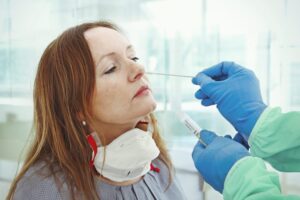
Throughout the Covid-19 crisis, the critical importance of trustworthy, accessible rapid antigen tests for illness screening has been more obvious. Antigen and antibody rapid antigen tests for Covid-19 are both used to look for distinct characteristics of the SARS-CoV-2 virus. Medical Device Network examines the various kinds of Covid-19 tests in further detail.
What are the several Covid-19 test types?
- To detect illness, polymerase chain reaction (PCR) tests are submitted to a laboratory.
- Lateral flow tests (LFTs) may identify Covid-19 on the spot but are not as reliable as polymerase chain reaction (PCR) rapid antigen tests.
- Antibody (or serology) tests cannot detect current infection but can assist determine whether a person has immunity to Covid-19.
What is polymerase chain reaction rapid antigen tests?
PCR rapid tests are used to screen for the presence of viral RNA, which is detectable in the body prior to the formation of antibodies or the onset of illness symptoms. This implies that the tests may detect whether or not someone is infected with the virus relatively early in the course of their sickness.
In the laboratory, chemicals known as reverse transcriptase or DNA polymerase are introduced to a nasopharyngeal sample for Covid-19 PCR rapid antigen tests. These chemicals function by multiplying any viral RNA that is present. This is to ensure that sufficient copies of the RNA are present to provide a positive result, as carefully designed primers and probes connect to sections of the virus’s genetic code to indicate the presence of a pathogen.
“PCR provides us a decent indication of who is sick,” explains Dr. Edward Wright, senior lecturer in microbiology at the University of Sussex. “They may be separated and contact persons they’ve been in contact with in order to be quarantined as well, just in case.” That is the actual benefit of today’s key diagnostic tests; you may interrupt the transmission chain and get a more complete picture of what is occurring.” learn more about using rapid antigen test at http://ancestorbridge.com/uncommon-info-on-how-to-use-rapid-antigen-tests-to-test-for-covid/
By scaling up PCR rapid antigen tests to screen large swaths of nasopharyngeal swab samples from inside a community, public health experts may get a better understanding of how a disease like Covid-19 spreads.
However, PCR is not without its limitations. These Covid-19 tests must be submitted to a laboratory for analysis, which means that individuals may have to wait several days to get their findings.
False negatives occur up to 30% of the time with various PCR tests, indicating that they are more effective for verifying the existence of an illness than for giving a patient the all-clear. They may also provide false-positive findings because they are so sensitive that they may identify dead, deactivated viruses in the body of someone who has recovered from Covid-19.
Dr James Gill, an honorary clinical lecturer at Warwick Medical School, stated: “Throughout the epidemic, the PCR rapid antigen tests techniques were upgraded, with the inclusion of more automation to minimise mistakes. Because we are examining swabs obtained from individuals who have a large number of different species floating about, we are effectively addressing the issue of how ‘correct’ the finding is.”

What about doing a lateral flow test?
LFTs and PCR rapid antigen tests are both antigen assays that are meant to detect active Covid-19 infection rather than antibodies to the illness. A nasopharyngeal sample is deposited on a tiny absorbent pad and then pulled down the pad through a capillary line to a strip coated with antibodies specific for SARS-Cov-2 proteins using a Covid-19 LFT. If these proteins are detected, a colored line will appear on the test, suggesting infection.
The primary advantage of LFTs over PCRs is that they do not need validation and produce findings within 15 to 30 minutes. What they gain in speed, they give up in precision.
A analysis of 64 trials from Europe and the United States revealed a substantial variation in the accuracy of various brands of LFT. Additionally, the research found that the tests were much more effective in detecting Covid-19 in those who had symptoms than in those who did not. The sensitivity of the LFT in symptomatic individuals varied from 34% to 88%, with an average accuracy of 72%. LFTs properly detected an average of 58 percent of persons with no symptoms who were infected.
While the use of LFTs for mass asymptomatic screening has been promoted in nations such as the United Kingdom, experts have expressed reservations about the utility of these sorts of Covid-19 tests in this context.
What is immunoassay rapid antigen tests?
“Antibody rapid antigen tests shows us the percentage of the population that is affected,” Wright explains. It will not reveal who is infected, since antibodies are developed after a week or two, after the virus should have been eliminated from the system. However, it identifies those who have been infected and those who should be immune to the virus.”
According to a research published in the journal Immunity, individuals who recover from even minor instances of Covid-19 continue to develop antibodies for at least five to seven months and maybe much longer.
According to historical investigations, persons who survived the SARS pandemic in the early 2000s retained antibodies in their blood for years following recovery. Given that both SARS and Covid-19 are caused by coronaviruses, it is logical to believe that Covid-19 might have a similar impact.
“If a sufficient number of individuals in the population have immunity, they will prevent the virus from spreading within the community, which is referred to as herd immunity,” Wright explains. “If someone is sick, the virus cannot spread as long as the others around them are immune.”
Unlike PCR rapid antigen tests, which often employ swabs to detect Covid-19, antibody rapid antigen tests typically utilize blood samples. This is because, in comparison to the respiratory tract, there will be a little quantity of Covid-19 circulating in the blood, but a considerable and quantifiable antibody presence in the blood post-infection. learn more about post-infection symptoms by clicking here.
Antibody rapid antigen tests are being used to assess immunological responses in individuals who have received the Covid-19 vaccine. The duration of vaccine-induced immunity is unknown, as is the requirement for booster injections. There has been some evidence that Covid-19 variations are reducing the effectiveness of some vaccinations, although they still seem to give enough protection against severe or deadly illness in the majority of cases.

